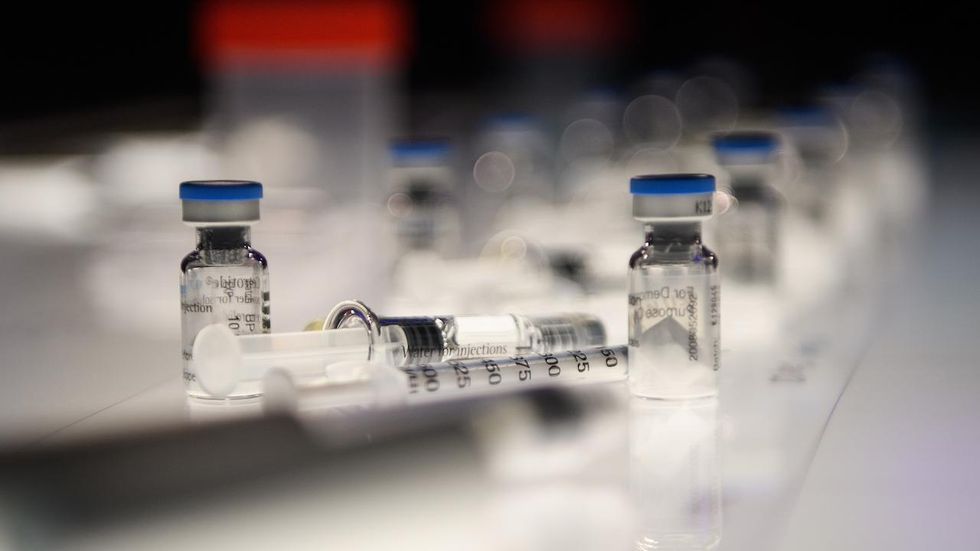
A China researcher claims world's first genetically edited babies, which were born in China earlier this month. (Leon Neal/Getty Images)

A Chinese researcher who studied at Rice and Harvard universities has claimed to have made the first genetically edited babies. The babies in question were born in China earlier this month, The Associated Press reported.
Scientist He Jiankui of Shenzhen told the Associated Press that he altered the DNA of the twin girls during the parents' fertility treatments. He used a powerful new gene editing tool called CRISPR-cas9, which has the ability to rewrite DNA, according to the report.
"I feel a strong responsibility that it's not just to make a first, but also make it an example," He told the AP. "Society will decide what to do next" in terms of allowing or forbidding such science.
Six other couples participated in the researcher's attempt to identify a genetic trait that would resist the HIV virus that causes AIDS. In each of the unidentified couples, the father was HIV positive and the mother was not.
Physics and bioengineering professor Michael Deem at Rice University in Houston, has claimed that he also worked on the project with He in China. Deem was He's adviser when he studied at there.
Genetic editing is banned in the U.S. for ethical reasons, including the risks it poses to DNA that can be passed on to future generations. In China, human cloning is illegal, but gene editing isn't specifically against the law.
He's claim has not been independently confirmed or published in a journal where other experts could review his work. The scientist revealed the project Monday to the organizers of an international conference that will begin Tuesday in Hong Kong and previously to the AP in exclusive interviews.
The news of the project shocked some scientists who believe genetic editing is unethical and unsafe. Some accused the researcher of experimenting with human life.
It's "unconscionable ... an experiment on human beings that is not morally or ethically defensible," Dr. Kiran Musunuru told the AP. Musunuru is a University of Pennsylvania gene editing expert and editor of a genetics journal.
"This is far too premature," said Dr. Eric Topol, who heads the Scripps Research Translational Institute in California. "We're dealing with the operating instructions of a human being. It's a big deal."
But one well-known geneticist, Harvard University’s George Church, defended He's attempt to edit the embryos' genes for HIV, which he called "a major and growing public health threat."
"I think this is justifiable," Church said.
The researcher used the CRISPR-cas9 to operate on DNA by either adding a gene or disabling a problem one. The tool has been used recently to treat deadly diseases in adults, but not in editing sperm, eggs, or embryos.
He's goal was to disable a gene called CCR5, a protein co-receptor that creates a doorway for HIV to enter the host cell.
First, He washed the sperm which separated it from the semen, where the HIV virus can be found. Using IVF, a single sperm was placed with a single egg where it created an embryo.
The gene editing tool was added to the lab dish. At 3-5 days old, the embryos were checked for editing.
The couples were offered the choice to use edited or unedited embryos in the pregnancy attempts that followed.
Six implant attempts of 11 embryos were made before the twin pregnancy was achieved, He told the AP.
Tests of the twins DNA suggest that editing worked on both copies of the gene of one twin and one copy was altered in the other twin. He said there appeared to be no harm caused to other genes.
He told the AP that he had practiced on mice, monkeys, and human embryos for years before experimenting on humans. The seven couples in the human trial were recruited through a Beijing-based AIDS advocacy group.
The Chinese researcher said that the participants were aware of the goals and risks of the project. They received free fertility treatments as part of the agreement to participate.
As for any children that were conceived through the project, He said he would provide health insurance coverage for them and follow-up with them until they reach 18 or longer if they agree as adults.
Pregnancy attempts for the other couples are on hold until the research can be analyzed by other experts in the field.
"I believe this is going to help the families and their children," He said. If it causes unwanted side effects or harm, "I would feel the same pain as they do and it's going to be my own responsibility."